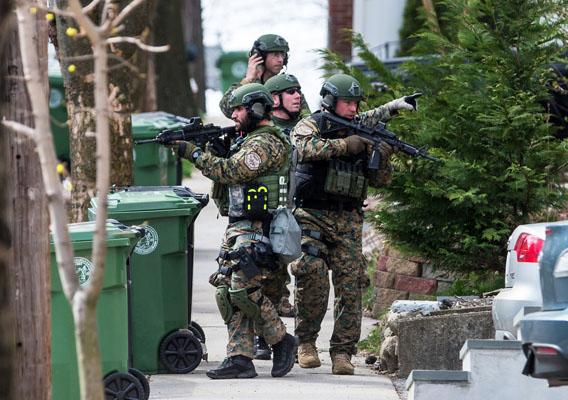Despite what I wrote the other day, all I really want right now is to be able to go to Dunkin Donuts. Unfortunately, here in Watertown, where I live, we’re being told to stay in our homes and off the streets. Businesses have been instructed not to open. Late last night, the manhunt for the Boston Marathon bombing suspects switched to this suburb of Boston, which is adjacent to Cambridge, where an MIT officer was shot by brothers Tamerlan and Dzhokhar Tsarnaev. Many of the metro area’s busier neighborhoods look eerily empty today, and this heavily Armenian community of about 30,000 is no different—it has turned into a ghost town. That is, if you don’t count the roughly 10,000 law enforcement officials, and the constant stream of helicopters overhead. It’s a cliché to say this isn’t the type of place where something like this happens—such an intense show of force would be out of place anywhere—but it does feel especially bizarre in this usually quiet town.
Earlier this morning, a perfect, glorious spring day on my quiet side street just off of School Street and Mt. Auburn, where much of last night’s drama unfolded, SWAT teams patrolled from house to house searching yards and trash barrels—in an unfortunate twist, today is trash day here. An extraordinary overabundance of chirping birds seem unaware of the most chaotic scene in the town’s history. An SUV happening down the street just now was immediately stopped and searched as I watched from my stoop, unsure whether raising a camera phone to record the situation would be a wise move or not. I may be a reporter, but it’s not every day I talk with a man outside my home with a machine gun slung over his shoulder; more likely a mother pushing a stroller.
“Where are you from?” one of the officers asked when I left my house this morning. I froze for a minute, thinking, wait, where am I from? Am I suspicious? “I’m from Kingston,” I said. Why did I move here, he wanted to know. It seemed like a test. “Um. My wife made me.” He didn’t laugh.
Perhaps there’s nothing to laugh about, although hiding out all night while the most wanted men in America were tossing IEDs at police and engaged in a firefight half a mile from my home engendered a morbid gallows humor, for me at least. For example, the scene unfolding down the street right now: definitely the biggest crowd the typically depressing Arsenal Mall has seen in a decade.* I miss the days when the police around here had nothing better to do than look for punk rock shows online.
Too soon, perhaps, but it was a long night for all of us. I was startled just before bed by what sounded like a series of gunshots and explosions. Maybe I’m being paranoid, I tweeted, but it seems like there’s a gunfight going on here now. In Watertown.
It turned out to be true. Reports on police scanners and Twitter had the chase coming up toward my neighborhood. Friends and colleagues in the neighborhood were live-tweeting about arrests and an immense police presence. What is one supposed to do in this situation, I thought? And why didn’t I know that so many of my friends and colleagues lived right around the corner?
My first thought was to lock the doors and stay away from the windows. My wife and I had just returned from a trip to New York City, to get away from Boston for a night, hoping things would have blown over by now. We made a huge mistake. What’s the protocol here? Does one wake your family when there’s a situation like this developing, or is it better to let them sleep through it? The blaring police scanner, incessant police sirens, and gunshots made that decision for me. Meanwhile, on Twitter, a steady stream of contrarians reminded us that this was not, in fact, the first incident of violence to have ever occurred throughout the world. A very comforting bit of reassurance, I thought, crawling up to the window to look for signs of news, worried that, any moment, a stray bullet would come out of nowhere, as it did for a neighbor.
It was a sleepless night for many of us in the area, as seemingly everyone I know was feeding a constant stream of police scanner chatter and, of course, misinformation into the mix. It was the missing Brown student, just like Reddit predicted, was one popular refrain. Others trumpeted, with a perverse sort of glee, at the floundering of media outlets. Traditional news is dead! Neither of those things turned out to be true. Outside, the street was cloaked in darkness, all of the lights in the houses turned off, though the huge police presence just over the hill illuminated the neighborhood with a dim backlight. Toward the early morning, the police announced they were going to retreat to a perimeter and wait for the morning light to restart their efforts. We slumped over our laptops in exhaustion with the scanner still shouting out frantic updates. They didn’t know exactly where the suspect was, but we were all cautioned to stay inside and stay alert. That wasn’t hard to comply with. As the afternoon drags on, and we wait for the OK to be able to leave our homes again, the trash barrel remains on the sidewalk, waiting to be picked up.
Read more on Slate about the Boston Marathon bombing.
Correction, April 19, 2013: This article originally misspelled the name of Arsenal Mall. (Return to the corrected sentence.)
